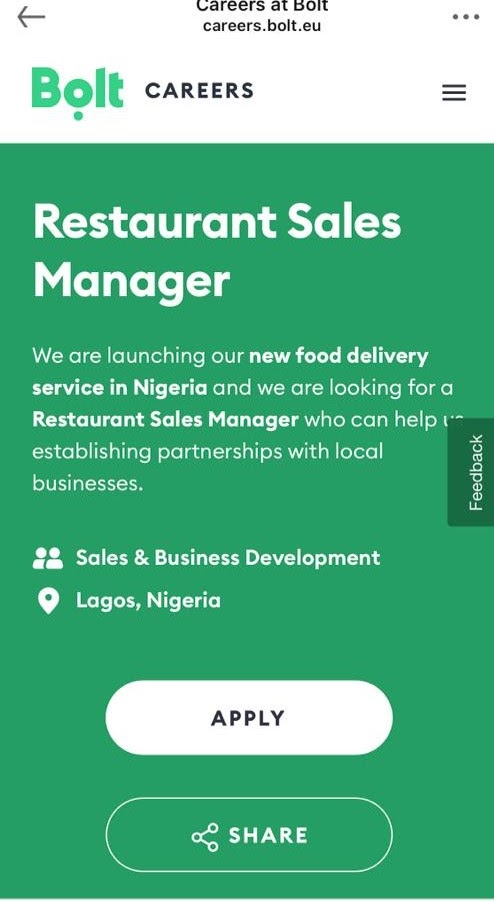The Estonian mobility startup, Bolt, is making a play for food delivery in Nigeria and at the moment, is trying to hire a business and sales manager for that arm of its business.
In a job ad seen by TechCabal, Bolt stated, “we are launching our new food delivery service and we are looking for a Restaurant Sales Manager who can help in establishing partnerships with local businesses.”

It comes one day after the International Finance Corporation (IFC) invested €20 million ($23 million) in Bolt. IFC’s investment was driven by Bolt’s expansion plan targeting underserved emerging markets.
This focus is one of the ways the company differentiates itself from its rival, Uber. But one thing both companies have in common is that they are betting big on food delivery.
Bolt currently offers food delivery services in 16 countries and 33 cities across the world and when it raised $182 million in December, it announced its intentions to expand the business.
Jumia food vs Bolt
While Uber is one of the biggest players in food delivery on the global stage, it has no food delivery service in Nigeria. Instead, that market is primarily served by Jumia, OyaNow and Gokada. Jumia Food saw some impressive growth during the lockdowns in Lagos with orders growing 30% month-on-month.
Besides Jumia Food’s growth, it is clear that there is a market here. According to the National Bureau of Statistics (NBS), Lagos residents spent ₦830 billion ($2 billion) eating out in 2019; representing 34% of total food expenditure.
It means that there’s a large enough market for Bolt and Jumia to compete. Bolt’s edge will be the fact that it has an established driver network within the country. One report claims that Bolt has 20,000 drivers within Nigeria.
If that figure is anywhere near accurate, Jumia food will face stiff competition in a market where competitors have struggled to match Jumia’s scale. Will the new activity also encourage Uber to launch Uber Eats in Lagos as well? Or will it be concerned about what the margins are in Nigeria?
Food delivery’s razor-thin margins
In the U.S, the margins on food delivery are notoriously razor-thin and despite the fact that millions of people use food delivery services, those companies are still unprofitable.
Nothing explains the problem quite like an excerpt from this Intelligencer article: “This has been an ongoing problem in the food-delivery industry: Huge growth in consumer demand has been achieved by charging customers less for delivery…That’s no way to make money in the long run.”
In Nigeria, food delivery services charge between 10-17% commission on each food order and don’t spend as much money on advertising as their foreign counterparts. Yet, profitability is hard to come by. One food delivery service told Stears that they haven’t cracked a profit in three years and Jumia Food’s parent company hasn’t made a profit since 2012. It feels like early days, but it will be interesting to see if the same profitability problems continue to dog food delivery in Nigeria.


Comments are closed.